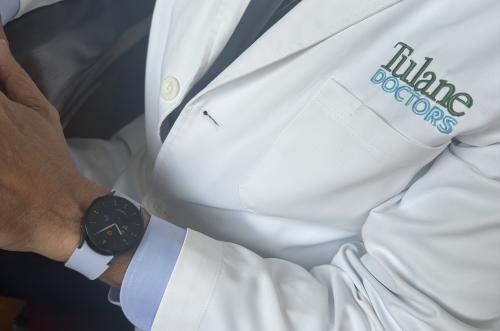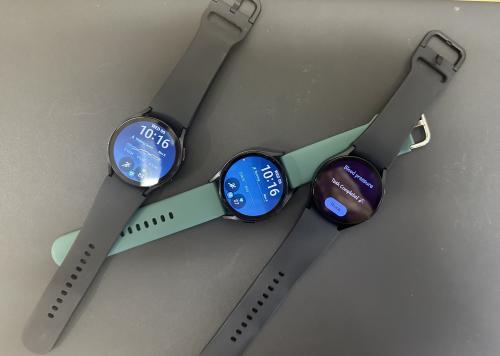HEARTBEAT study partnership with Samsung to transform community health and technology industry partnerships at Tulane

Q&A with Dr. Nassir F. Marrouche
Director of TRIAD Center, Professor of Medicine
Vice Chair, Innovation & Entrepreneurship
John W. Deming Department of Medicine at Tulane School of Medicine
The new HEARTBEAT study by the Tulane Research Innovation for Arrhythmia Disorders (TRIAD), in collaboration with Samsung Research America, will test the relationship between biological signals collected on a Samsung Galaxy Smartwatch and heart-related health problems, which may help enhance the prediction, identification, and understanding of cardiovascular diseases and comorbidities.
Individuals above 18 years of age in the greater New Orleans area and with one or more heart-related health conditions may be eligible to participate. The participants will be provided with a Samsung Galaxy Smartwatch and will use the Heartbeat app installed on any compatible smartphone to complete daily health checks and occasional surveys.
The Tulane Innovation Institute interviewed Dr. Nassir Marrouche to talk about what this study means for the community and the future of industry partnerships at Tulane University.

Please describe the HEARTBEAT study and why Samsung selected the Tulane Research Innovation for Arrhythmia Discovery (TRIAD) and our community (the Greater New Orleans area) for this program.
First, let me emphasize that the HEARTBEAT study is all about collaboration, innovation, and positively impacting community health. This collaboration between Samsung and Tulane’s TRIAD Center is designed to harness data from Samsung Galaxy Smartwatches, integrating it with electronic medical records to predict and prevent heart disease. Samsung partnered with Tulane and TRIAD because of our proven excellence in digital health research. The Greater New Orleans community is an ideal setting for this study, given its high rates of cardiovascular disease, which means early intervention strategies can have a meaningful, life-changing impact. By leveraging the latest digital technology and local expertise, the HEARTBEAT study drives better health outcomes for the whole community.
Given Louisiana’s high rates of cardiovascular disease, how do you envision continuous monitoring from Samsung smartwatches transforming early detection and prevention in our area?
Let’s talk about early detection, prevention, and making a difference in our community. Louisiana, especially New Orleans, faces high rates of cardiovascular disease. The HEARTBEAT study uses continuous monitoring from Samsung smartwatches to transform how we approach early detection and prevention. In the first year, we’re focusing on studying the progression of heart disease using wearable data and developing a proof-of-concept for a new digital biomarker. This continuous monitoring allows us to catch early warning signs, enabling proactive interventions that can save lives. With continuous monitoring, we’re making strides toward reducing the impact of heart disease in our local community and beyond.
How do you see this study changing the traditional patient-provider relationship and creating more personalized healthcare opportunities?
The HEARTBEAT study is fundamentally about empowerment, proactive care, and personalization. Integrating consumer technology into healthcare will transform patients into active participants in their health journey. Traditionally, healthcare has been reactive, with providers addressing issues only after patients experience symptoms. This study changes that dynamic by utilizing continuous monitoring through Samsung smartwatches to provide real-time health insights.
By continuously tracking vital signs such as heart rate, ECG readings, and other biometrics, the study enables early detection of potential issues, allowing healthcare providers to intervene before conditions worsen. This shift to a more proactive model means that patients can receive timely interventions, potentially preventing severe health events like heart attacks or arrhythmias.
Furthermore, integrating this data into electronic medical records allows providers to personalize care plans based on each patient’s unique health profile. This fosters a stronger, more collaborative patient-provider relationship, where healthcare decisions are driven by continuous insights rather than periodic checkups. The HEARTBEAT study is paving the way for a healthcare model that is more proactive, patient-centered, and tailored to individual needs, ultimately leading to better health outcomes and quality of life.
How does this partnership between Samsung and Tulane University represent a new direction for medical research and innovation at our university?
Let’s focus on big data, multidisciplinary collaboration, and integrating scientific research with clinical innovation. The digital health market is a $300 billion opportunity, and most institutions are not yet fully prepared to leverage its potential. Tulane, however, is taking a bold step forward by harnessing the power of big data to transform medical research. The HEARTBEAT study exemplifies how we integrate continuous data collection from wearable devices with advanced analytics to derive meaningful insights.
We can translate raw data into actionable healthcare solutions by marrying scientific research with clinical innovation. This partnership with Samsung is a prime example of how we are bridging the gap between cutting-edge research and real-world clinical applications. Our multidisciplinary approach brings together machine learning experts, statisticians, and clinicians to ensure that the data we collect is scientifically rigorous and clinically relevant.
By leveraging big data, Tulane transforms how we conduct research and deliver patient care, setting a new standard in the digital health landscape. This collaboration with Samsung represents a new direction where Tulane is leading the way in integrating technology, scientific discovery, and clinical practice to drive better patient outcomes. This approach positions Tulane and TRIAD as leaders in digital health, making impactful contributions to the scientific community and the healthcare industry.
How can the Tulane Innovation Institute support additional technology and industry partnerships like this one in the future?
This is about AI development, integration, and commercialization. At Tulane, we understand that developing an AI model is only the first step. The next phases—generalization, integration, and commercialization—are crucial for real-world impact. Tulane’s established infrastructure for data collection and continuous monitoring positions us perfectly to support these efforts. The Tulane Innovation Institute can assist companies by providing the resources and expertise needed to integrate new technologies into healthcare settings and scale them for commercial use. Our partnership with Samsung demonstrates how Tulane’s infrastructure and the Innovation Institute can accelerate innovation from concept to market.
Why should other medical and technology companies work with Tulane University researchers and medical professionals?
Let’s talk about infrastructure, experience, and partnerships. Tulane University offers an unparalleled combination of resources, making it an ideal partner for medical and technology companies. Our researchers and medical professionals have the infrastructure, experience, and established patient base necessary for successful studies. We also have deep community ties, which allow us to conduct impactful research that directly benefits those we serve. By partnering with Tulane, companies can access a streamlined research environment that accelerates the development and deployment of innovative healthcare solutions. This unique nexus of expertise and capability positions Tulane as the ideal setting for companies looking to advance digital health technologies with real-world impact.
Finally, I want to highlight that at Tulane, we are deeply committed to using technology and research to drive innovation, collaboration, and positive outcomes for our community. The HEARTBEAT study with Samsung is just the beginning of what’s possible when industry and academia come together. This partnership sets a new standard in how we approach healthcare, paving the way for more collaborations to transform patient care and improve health outcomes, especially in communities that need it most.
To learn more about the HEARTBEAT study and how you can enroll, visit heartbeatstudy.com.

